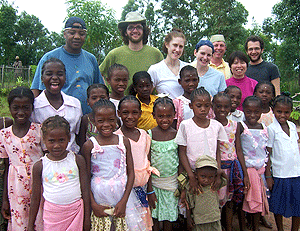Five students and one faculty member boarded a plane for Madagascar in March, but they weren’t looking for exotic beaches.
They were headed to the remote Third World Mahabo Commune to assess the impact of economic development. The voyage to the commune on the southeastern edge of Madagascar, an island nation southeast of Africa in the Indian Ocean, was the second step in an ongoing effort by WUSTL students to create ideas that might result in solutions to some of the world’s most challenging problems.

The purpose of the trip was to balance economic, social, environmental and political factors in a 10-village area that includes about 9,000 rural Malagasy people.
Getting involved
The School of Law and the Skandalaris Center for Entrepreneurial Studies got involved when the Missouri Botanical Garden asked for ideas. The garden has been involved in Madagascar for several years through its Center for Conservation and Sustainable Development.
For the past four years, the garden has increased its connections with the Mahabo Commune. The garden’s efforts have created more than 20 jobs, built a library, developed a plant nursery, constructed buildings and developed relationships with local leaders that have helped restore the endangered littoral forest and its lemurs.
Despite their success, garden workers realized they needed economic growth for these gains to be sustained.
The first goal was to marry conservation aims with sustainable economic growth to improve the quality of life in Mahabo.
The second goal was to get perspectives that might lead to replicable approaches that could be applied in other Malagasy villages with similar environmental and economic issues.
In fall 2006, third-year law student Kate Burson and two Arts & Sciences students — Kristopher Kelley, a junior majoring in aesthetics and society and entrepreneurship, and Russell Kohn, a senior majoring in math and economics — began working on the issue as part of the entrepreneurship Hatchery class in the John M. Olin School of Business.
In January 2007, the team expanded to include Teresa Wallace, a 2006 graduate of the George Warren Brown School of Social Work and a first-year MBA student, and Yiping Chen, a first-year MBA student.
Traveling to Madagascar
Starting their trip to the world’s fourth largest island on March 3, the five students were accompanied by Kenneth A. Harrington, Hatchery professor and managing director of the Skandalaris Center; Armand Randrianasolo of the garden; and Theresa Wilson, founder of The Blessing Basket Project.
The Blessing Basket Project is a non-profit company based in St. Louis and was a 2004 Olin Cup Competition winner. The business pays weavers in six lesser-developed countries prosperity wages 10-15 times higher than fair-trade levels.
The organization wanted to understand how the new wealth would impact the village and how it was being spent and then would set a baseline for future outcomes and change measurement.
“It was challenging, both physically and intellectually,” Harrington said of the trip. “But after their pre-trip work, the students were prepared to teach and share their diverse expertise and knowledge with each other. Seeing them collaborate and think through how new wealth might impact the environment, economy and society was great. These are tough problems.”
Each student examined issues based on his or her area of study, including community rule of law, cultural and family issues, technology innovation potential, environmental impact and entrepreneurial economic development.
In particular, the students studied the impact of The Blessing Basket Project in its first year of operating in Mahabo. They also were looking for ways to expand beyond the project to find other benefits.
Experiencing a new world
Arriving in Madagascar was an eye-opening experience.
“When we visited Mahabo’s villages, we could tell that they had different characteristics,” Kelley said. “On the coast, people seemed much better off. They sold lobsters to a local company. They had more fish and rice.”
In other villages, recent cyclones destroyed crops, resulting in food shortages. Rice fields were being restored with hand tools while people survived on low-nourishment breadfruit.
Before the trip, the group knew a concern was the danger The Blessing Basket’s success might pose to the local women who find themselves earning more money.
“Infusing income through women in a patriarchal society could change social stature, causing a backlash against the women,” Wallace said. “One of our fears was that the Blessing Basket’s wealth would go directly to the women weavers and upset the men.
“To the contrary, we found that the extended family networks prevent domestic violence, and men often rely on women to control household budgets,” Wallace continued. “Also, a lot of men expressed the importance of the income that weaving has always brought in.”
The partnership will continue to grow as more students and professors get involved. And Wallace plans to intern with Blessing Basket this summer.